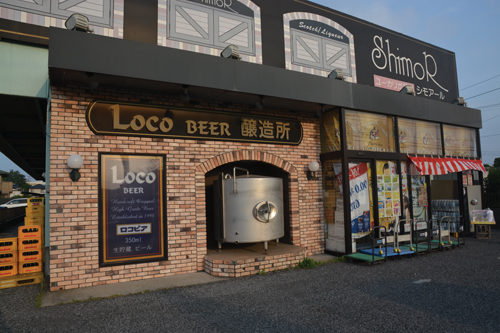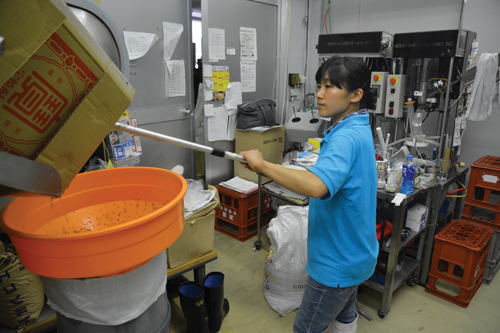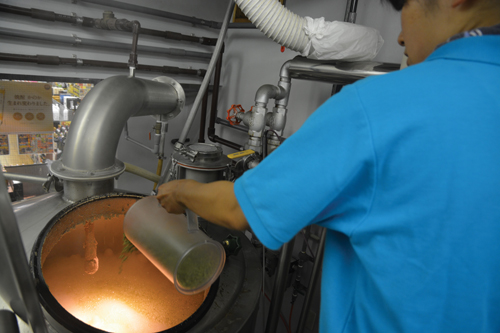by Kumaigai Jinya

Narita Airport is a busy hub of travel not only for international flights, but now also domestic ones as well. Just a short hop away lies Sakura City, and therein lies Loco Beer.
Loco Beer launched in 1998, having been established by Shimor, an alcohol retailer operating nine branches within Chiba prefecture. The same company had previously established Bôsô Beer in the town of Chônan. The president of the company asked its roughly one hundred employees who wanted to be a brewer at Loco Beer and the woman who eventually answered that call and is still the head brewer to this day was Kagitani Momoya.
Kagitani first joined the company in 1995 and managed a corner in one of the branches that carried cosmetics, perfume and silver accessories. “You actually wouldn’t believe how much of this stuff I was able to sell at a liquor store.” Just about when she was getting the hang of her job in 1997, the president suddenly put out the notice he needed a brewer. She didn’t jump for it right away, but mulled over it a few months. The president then approached her—one of just a few female employees in the company—and shared his idea, “As a concept for the second brewery, I want to do ‘Beer for women brewed by a woman.’”
In the end, Kagitani figured she would regret not taking the chance if she really grew to love beer and decided to dive in. The flip side of that, though, was that Kagitani didn’t really like beer so much at the time. Her hesitation was connected to what many people who think they don’t like beer say: it’s too bitter. She did, however, have an interest in sake from the time she was a child—we’re not talking about drinking it since a child, of course. Rather, when her mom boiled rice in the evenings, she would add some sake. The aroma drifting through the house—rich and full, a little sweet—developed keenly positive associations in her memory.
The equipment she started out using in 1998 was in the back of Shimor’s Yukarigaoka branch, where it’s still located. In the beginning she worked with the president of Bôsô Beer, who had ample experience, but gradually found herself doing more and more of the work alone. The original line-up only featured two beers, Loco Beer Green and Loco Beer Blue, both of which used malt extract. However, since Loco Beer was using extract that already included hop, she couldn’t make any real adjustments to the taste. Kagitani laughs, “Neither were all that bitter, so they fit my tastes,” but customers complained it wasn’t very aromatic.
She realized the limitations of this brewing method and decided to take the path of most other breweries that ground their malt from the start and had a hand in each step of the brewing process. This meant changing most of the equipment. She also began to receive some advice on brewing technique from Yamamoto Ryuzo, the brewer at Suntory who had given the world that brand’s Premium Malt. Then in October of 1999, she completely switched to a new system and brewing method. That following year, she developed a kölsch called “Kaori no Nama” which would become a regular part of the lineup. At the same time, she surprisingly also started making an alternative kölsch called “Hojun Bakushu.”
Kölsch beers originated in Köln (Cologne), Germany, the result of warm fermentation but cold conditioning (lagering). They’re not so much golden as straw-yellow in hue. Slightly dry, they also exhibit subtle sweetness lending to smooth mouth feel and a high level of drinkability. Fruity aromas are not uncommon either. Hop bitterness varies from perceptible to prominent, but is never extreme. Kaori no Nama is rather mild, even among beers in this category, while the Hojun Bakushu has distinct fruit aroma with hop bitterness.
Developing two beers for a standard lineup from the same style category was probably not so simple. But at the 2000 Japan Asia Beer Cup (now called Asia Beer Cup) the Kaori no Nama won gold while Hojun Bakushu won silver. Later that year, at the International Beer Competition (now called International Beer Cup), they both won again, in reverse order. When she told Yamamoto, he laughed a little sheepishly, “That’s too much for your first year.”
Kaori no Nama went on to win silver at World Beer Cup in 2004, and then bronzes in 2006 and 2008. Having repeated its early success, Loco Beer started to gain wider recognition for its quality.
Kagitani first visited Cologne in 2004 and tried as much kölsch in the city as she could, reflecting, “The two kölsch beers that I had developed fit neatly into the style category, but I didn’t encounter any similar ones there. I was happy that I had managed to hit on something so unique.”
She still maintains her relationship with Suntory as when, for example, she needs some of her beer analyzed. There, they tend to compliment her on the beers’ clarity, noting, “We don’t see much craft beer like this.” The ‘secret’ is in the filtering. The equipment at Loco involves three valves that require simultaneous operation and this in turn requires three craftsmen.
The current lineup is the aforementioned Kaori no Nama and Sakura Steam. The former is sweet and bitter, with a bouquet of subtle fruity aromas and overall good balance. The latter is, as the name suggests, a steam beer, which means that it’s a lager fermented at higher temperatures with fruity notes, but very light and drinkable from its conditioning. The fruity aromas actually come from the yeast and merge with hints of malt freshness for a beer that’s much more bitter than sweet. And just as the bitter aftertaste hits you and you think that’s it, that malty flavor comes floating back. It’s an exciting beer.
In more recent years, she’s been ambitiously brewing a range of styles that most other Japanese breweries aren’t really touching, including a barley wine, a Baltic porter and a strong ale. Right at the time I visited, I got to taste her “Immigrant Pilsner.” In terms of style, it’s a classic American pilsner, which was the result of German immigrants in America recreating the pilsners of their old home but with ingredients from America’s rich agricultural basket. Like recipes of that time, Loco Beer also uses corn. While it has a rather crisp and dry body, the hop bitterness is prominent. Drink it when you’re feeling down and I bet its sessionability will lift your cares for a while.
One of the more interesting limited edition beers is the Unite Pale Ale, which she brewed this past March. There are many women participating in the craft beer movement around the world, but unfortunately it’s not always a work environment that provides women peace of mind. In America, where this problem persists as well, a group of women working in the beer industry founded the “Pink Boots Society” (PBS). In conjunction with International Women’s Day, PBS put out a call around the world for women in the industry to brew together as a way to raise their profile. Kagitani, together with the female owner and manager of Beer Pub Watering Hole in Yoyogi, Tokyo, brewed a collaboration beer, the profits of which they donated to PBS. Kagitani is also a mother who has given birth twice since becoming a brewer.
Loco Beer currently sells its brews through its website, Shimor’s liquor stores and a number of beer pubs. Kagitani’s oldest retailer is Kurakura in Kanda, which has been carrying her beer for over ten years and moves quite a bit of it. In Chiba prefecture, Beer O’Clock near Chiba Station sells about 100 liters a month, while Arrows in Funabashi City and Ichikawa City carries it with the proud banner of “local beer.” Sure, you can order some over the internet, but if you do have the chance to go to Chiba, please patronize these places. Drinking local beer (from which the name “Loco Beer” derives) locally has a distinct pleasure and, as many know, its freshness is unparalleled.


This article was published in Japan Beer Times # () and is among the limited content available online. Order your copy through our online shop or download the digital version from the iTunes store to access the full contents of this issue.



